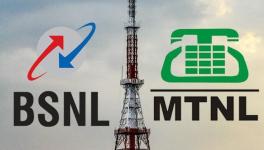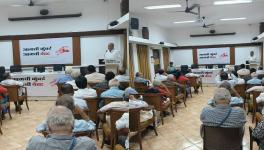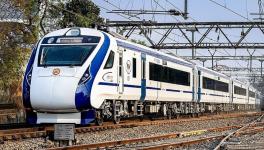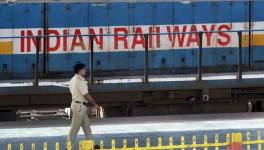Indian Railways Planning to Invite Private Players to Run Trains
What happens when the ruling government’s ministers contradict themselves? When the government fails in fulfilling its responsibilities? The answer is: Privatisation.
According to a railway board document, as reported by The Times of India, the government is “seriously” planning to rope in private players to run passenger trains on low congestion and tourist routes.
In 2017, the then Union Minister for Railways Suresh Prabhu ruled out privatisation of Indian Railways, saying it cannot ignore the common man who depends hugely on the public transporter.
Last year, while addressing a press conference, the newly appointed Minister for Railways Piyush Goyal said that there were no proposals for privatisation and it would not happen in the future as well.
Private Firms to Run Indian Trains?
As per the TOI report, two trains will be offered to Indian Railway Catering and Touring Corporation (IRCTC), by the railways, to operate. The Railways is expecting a lump sum amount in return to the outsourcing of the ticketing and the on-board services to IRCTC.
In addition to it, the Railways is also planning to invite private players “to participate in the bidding process for rights to run passenger day/overnight train sets connecting important cities.”
Also read: Indian Railways on the Fast Track to Total Privatisation
The Railways has also proposed to corporatise the units that manufacture coaches, including associate workshops, the report added.
These proposals – floating around in the internal communications of the ministry – reflect on the hypocrisy and the contradictions between the words and the doings of the ruling government.
NewsClick spoke to Shiv Gopal Mishra, General Secretary of All India Railwaymen’s Federation (AIRF). He said no such proposals have been presented to the union for discussion yet.
The union won’t allow for privatisation of the Indian trains, he added.
Fast Track Privatisation
This is not the first attempt by the ruling government to privatise the Indian Railways, or any other Public Sector Unit, for that matter.
Earlier, NewsClick had reported on how the Indian Railways has decided to auction 23 railway stations across the country to the private firms. As part of the “modernisation of stations”, Indian Railways has allowed private players to commercially exploit railways’ land by building malls, cinema halls, hotels and speciality hospitals within the station premises.
The government has, in 2014, allowed 100% FDI in railways infrastructure through automatic route which resulted in the establishment of two rail loco factories in Bihar by foreign companies.
The Mumbai-Ahmedabad high speed rail corridor is the latest example of increased presence of foreign players in the operations and services that are offered by the Indian Railways.
While the mainstream media appreciates the enthusiasm shown by the private players and often calls – without considering the ill-effects – for total privatisation of Indian railways, it is imperative to question the timing and the objective of the entry of private firms.
Arvind Kumar Singh, former advisor to Ministry of Railways while speaking to NewsClick, provides an answer to this. According to him the only objective of the private firms is to exploit the resources of Indian Railways and maximise their profits.
Also read: ‘BJP Govt’s Railway Budget Cut a Pointer Towards Privatisation’
“A private player is not interested in the projects that require heavy investments like putting railway tracks etc. They are only interested in the already developed infrastructure of the Indian Railways and are looking to just provide services and charge exorbitant amounts in return,” Singh said.
The inability of the Indian Railways in providing these services can further be accrued to the failure of the ruling governments in filling up the job vacancies in the sector and thus strengthening the workforce.
“The railway workforce has decreased over the years and one cannot expect from them to offer good services in the absence of required employee. What is needed now is for the government to fill the vacancies which will allow the Indian Railways to manage its operations in an efficient manner,” he added.
Privatisation Leads to Marginalisation of the Poor
In 2018, a 25 page report by the United Nations criticised widespread privatisation of public goods in societies and concluded that it leads to elimination of human rights and furthers marginalisation of the poor.
By UN's own admission, the World Bank, the International Monetary Fund, and even the UN itself have aggressively promoted widespread privatisation of basic services, without regard to the human rights implications or the consequences for the poor.
As far as the railways are concerned, the experiences of privatisation in multiple countries like Japan, UK, and Germany should serve as an eye-opener for the ruling government and its ministers who often call for the railways to reach the “poorest of the poor”.
Get the latest reports & analysis with people's perspective on Protests, movements & deep analytical videos, discussions of the current affairs in your Telegram app. Subscribe to NewsClick's Telegram channel & get Real-Time updates on stories, as they get published on our website.
























